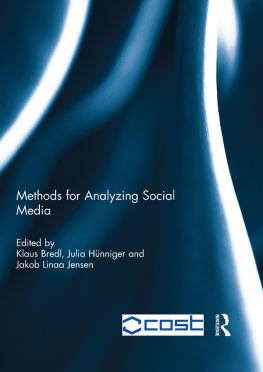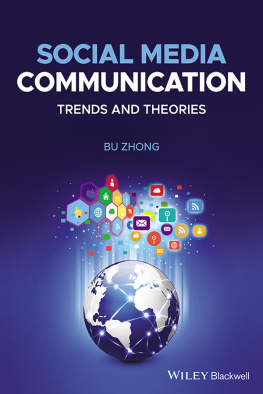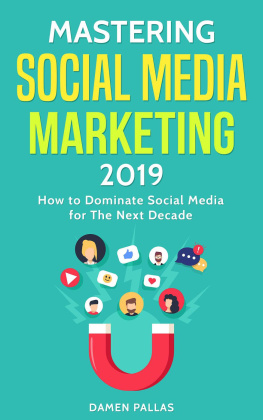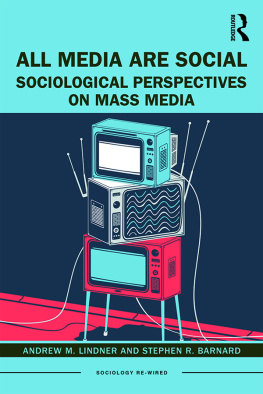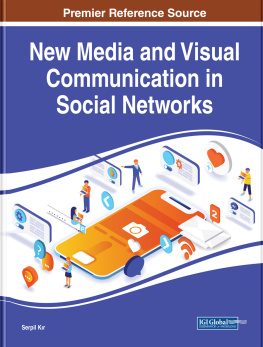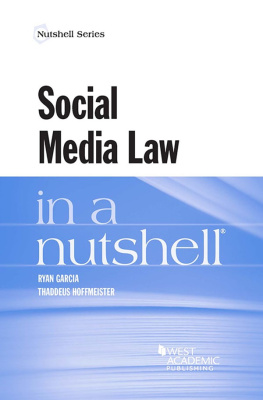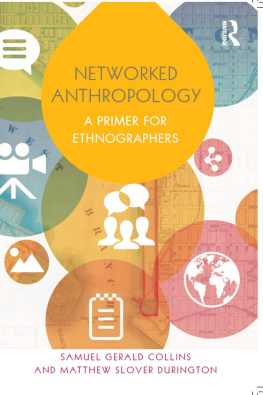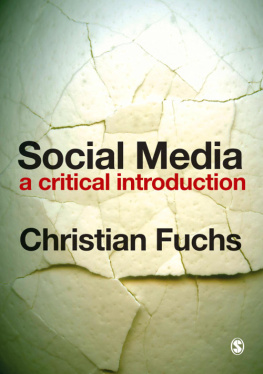
Becoming-Social in a Networked Age
This is the book on post-documentary technologies that Ive been waiting for: an understandable, but also deep and critical explanation of the philosophical assumptions, the form and functions, and the political implications and possibilities of recent new media technologies.
Ronald E. Day, Indiana University at Bloomington
This book proves that critical consideration of the processes of subjectivity belong in the foreground of media, technology and software studies. Vanquishing the shallow presumptions of subjecthood and identity that linger in accounts of social computing, Neal Thomas expands the philosophical space currently available for the investigation of how sociality is constituted and a post-individual subjectivity is structured by a-signifying machinic relations.
Gary Genosko, University of Ontario Institute of Technology
This book examines the semiotic effects of protocols and algorithms at work in popular social media systems, bridging philosophical conversations in human-computer interaction (HCI) and information systems (IS) design with contemporary work in critical media, technology and software studies. Where most research into social media is sociological in scope, Neal Thomas shows how the underlying material-semiotic operations of social media now crucially define what it means to be social in a networked age. He proposes that we consider social media platforms as computational processes of collective individuation that produce, rather than presume, forms of subjectivity and sociality.
Neal Thomas is Assistant Professor of Media and Technology Studies in the Department of Communication Studies at the University of North Carolina at Chapel Hill, USA.
Routledge Studies in New Media and Cyberculture
For a full list of titles in this series, please visit www.routledge.com.
30 Girls Feminist Blogging in a Postfeminist Age
Jessalynn Keller
31 Indigenous People and Mobile Technologies
Edited by Laurel Evelyn Dyson, Stephen Grant, and Max Hendriks
32 Citizen Participation and Political Communication in a Digital World
Edited by Alex Frame and Gilles Brachotte
33 Feminism, Labour and Digital Media
The Digital HousewifeKylie Jarrett
34 The Politics of Ephemeral Digital MediaPermanence and Obsolescence in Paratexts
Edited by Sara Pesce and Paolo Noto
35 Studying Digital Media AudiencesPerspectives from Australasia
Edited by Craig Hight and Ramaswami Harindranath
36 Between the Public and Private in Mobile Communication
Edited by Ana Serrano Tellera
37 Performing Digital ActivismNew Aesthetics and Discourses of ResistanceFidle A. Vlavo 38 Online Activism in Latin America
Edited by Hilda Chacn
39 Becoming-Social in a Networked Age
Neal Thomas
Becoming-Social in a Networked Age
Neal Thomas
First published 2018
by Routledge
711 Third Avenue, New York, NY 10017
and by Routledge
2 Park Square, Milton Park, Abingdon, Oxon OX14 4RN
Routledge is an imprint of the Taylor & Francis Group, an informa business
2018 Taylor & Francis
The right of Neal Thomas to be identified as author of this work has been asserted by him in accordance with sections 77 and 78 of the Copyright, Designs and Patents Act 1988.
All rights reserved. No part of this book may be reprinted or reproduced or utilised in any form or by any electronic, mechanical, or other means, now known or hereafter invented, including photocopying and recording, or in any information storage or retrieval system, without permission in writing from the publishers.
Trademark notice: Product or corporate names may be trademarks or registered trademarks, and are used only for identification and explanation without intent to infringe.
Library of Congress Cataloging-in-Publication Data
CIP data has been applied for.
ISBN: 978-1-138-71902-6 (hbk)
ISBN: 978-1-315-19562-9 (ebk)
Typeset in Sabon
by codeMantra
Though now well in the rear-view mirror, this work represents a (seemingly endless) mutation, extension, and updating of my doctoral thesis. First and foremost then, I am grateful to my original PhD project advisor Darin Barney, who was the consummate mentor. Jonathan Sterne also had an important if punctuated influence on my time as a doctoral student at McGill. Along with Darins seminar on technology, Jonathans seminar on repetition introduced me to thinkers and theories that will forever color my scholarship.
More recently, I am grateful to the many people whove offered support and guidance as I worked to finish the book. Ronald Day is a tireless promoter of my work and ideas, and conversations with him over email in the past few years have helped to buoy my spirits in anxious times. Roy Bendor has similarly been a long-time sounding board and friend. I am grateful to Sarah Sharma and Ken Hillis for being early mentors upon my arrival to UNC, and to Michael Palm for listening to me complain in abstruse ways about the manuscript while carpooling. All three of them have helped me acclimate to academic life in the United States. I am especially grateful to Ken for his early advice as a mentor, and for keeping my service responsibilities manageable while he was department chair. I owe a similar debt of thanks to our current chair Pat Parker, who has been continuously supportive of me as deadlines loomed, and to Lawrence Grossberg, for reading the full final draft.
UNCs Department of Communication is an incredibly stimulating and rewarding place to work, not least because I get to interact with graduate students, who regularly inspire me with their enthusiasm and subtlety of thought. I was especially glad to have arrived while Bryan Behrenshausen was a doctoral candidate; his intellectual curiosity and theoretical acumen were a model for pursuing my own ideas. I am also grateful for having discovered fellow-travelers in the School of Library and Information Sciences ORG reading groupincluding Ryan Shaw, Melanie Feinberg, and their thoughtful graduate students. Conversations with Stephen Wiley and participants in his graduate seminar on Guattari, Deleuze, and Media Theory at NC State were immensely helpful in honing my understanding of the Deleuzoguattarian universe.
I must also acknowledge that this book would not have been completed, were it not for Kumi Silvas regular encouragement, and her semi-frequent harangues to finish, already. She and David Monje read early drafts of chapters, as well as the books proposal, graciously casting a critical eye whenever necessary.
Finally, I extend the greatest acknowledgements to my family, for supporting me on a personal level throughout. Whether they know it or not, my brothers Bryan and Hugh have each served as sounding boards for my perspective, helping to adjust my ideas to the forces and realities of contemporary life. Most importantly, my parents, Paul and Roberta, remain a lifelong source of encouragement and support.
Please note that a section of chapter three, and a portion of chapter six adapts material from a 2015 article, Choice or disparation? Theorizing the social in social media systems, published in the Westminster Papers on Communication and Culture, Volume 10, Issue 1.


